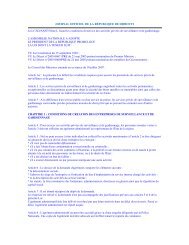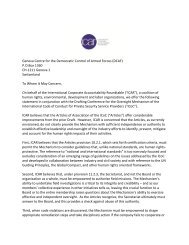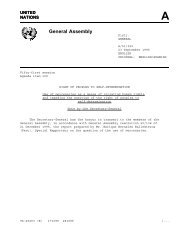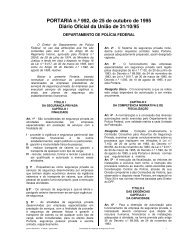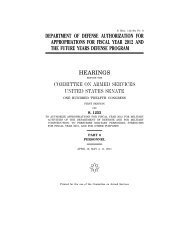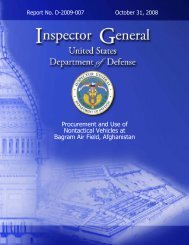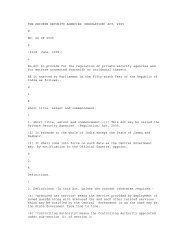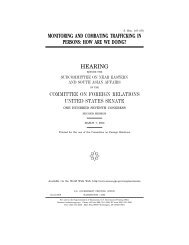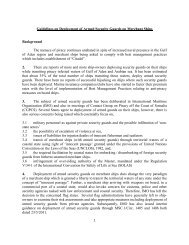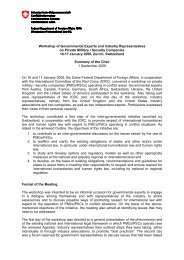Security Assistance; and Logistics - Federation of American Scientists
Security Assistance; and Logistics - Federation of American Scientists
Security Assistance; and Logistics - Federation of American Scientists
Create successful ePaper yourself
Turn your PDF publications into a flip-book with our unique Google optimized e-Paper software.
A team <strong>of</strong> seven U.S. mentors training Iraqi Air Force flight surgeons <strong>and</strong> flight medicaltechnicians had rapidly identified <strong>and</strong> corrected previously unaddressed manpower <strong>and</strong>training process problems that had prevented effective operations.As the Iraqi Air Force exp<strong>and</strong>s to more locations <strong>and</strong> its aeromedical section grows froma staff <strong>of</strong> 36 to the anticipated end state <strong>of</strong> 120, the medical mentoring <strong>and</strong> transitionCoalition Air Force Training Team will need to grow to maintain objective aeromedicalpr<strong>of</strong>iciency at multiple Iraqi Air Force locations. A strong foundation had been laid thatcould ensure ongoing success as the Iraqi Air Force takes on more responsibility <strong>and</strong>moves towards independent operations.Medical Mentoring ProcessEffective mentoring depends on having qualified personnel embedded at tactical,operational, <strong>and</strong> strategic levels so advice, support, <strong>and</strong> troubleshooting can besimultaneously passed up <strong>and</strong> down both the Iraqi <strong>and</strong> U.S. comm<strong>and</strong> chains.This process should be clearly established for the key operational pr<strong>of</strong>iciency areas <strong>of</strong>comm<strong>and</strong> <strong>and</strong> control, clinical care, <strong>and</strong> medical logistics.For example, a U.S. medical mentor at the tactical unit level would help his Iraqicounterpart identify a medical supply shortfall <strong>and</strong> help prepare a supply requisitionaccording to Iraqi Army procedures. The U.S. mentor at the tactical unit level wouldnotify the U.S. mentor at the next level up that the requisition is working its way throughthe system once that particular requisition is put into the Iraqi Army medical supplysystem.This next-level mentor would then work with his Iraqi counterpart to find the requisition,approve it, <strong>and</strong> forward it to an Iraqi Location Comm<strong>and</strong> to be filled. This mentor wouldalso notify the U.S. mentor at the Location Comm<strong>and</strong> that the requisition had beenapproved <strong>and</strong> needed to be filled. The Location Comm<strong>and</strong> mentor would work with theIraqi Location Comm<strong>and</strong> staff to fill the requisition <strong>and</strong> ship the items appropriately, orto forward the requisition to the Taji National Depot according to Iraqi Army procedures.This process works from the top down as well as from the bottom up, to pass downorders, new policies, <strong>and</strong> procedures; <strong>and</strong> it applies in many administrative <strong>and</strong> clinicalareas as well. Lack <strong>of</strong> mentors at any level prevents the entire system from functioningeffectively.Measuring Effectiveness <strong>of</strong> Medical MentoringEffective medical mentoring <strong>and</strong> advising requires in-depth engagement with Iraqi Armymedical personnel at field units, Location Comm<strong>and</strong> clinics, recruiting <strong>and</strong> training sites,<strong>and</strong> medical logistics depots. Tools must be developed that support timely <strong>and</strong> accuratedata collection so problems are identified, elevated, <strong>and</strong> corrected by senior leaders.Typical problem areas include inadequate numbers <strong>of</strong> properly trained medical staff,equipment <strong>and</strong> supply shortfalls, <strong>and</strong> weak management <strong>and</strong> operational readiness140



